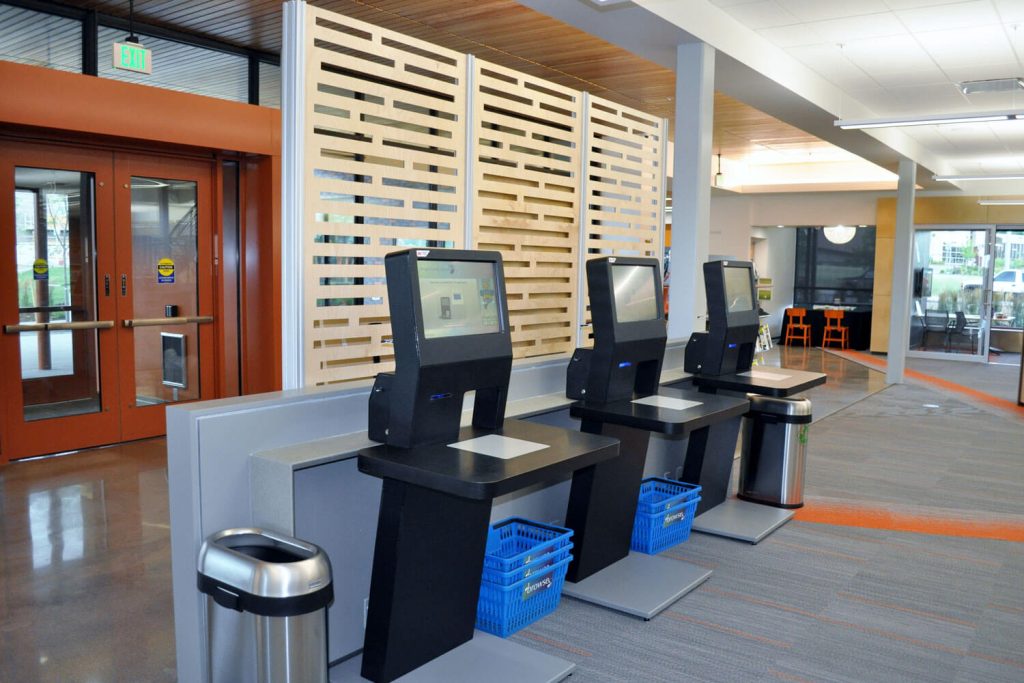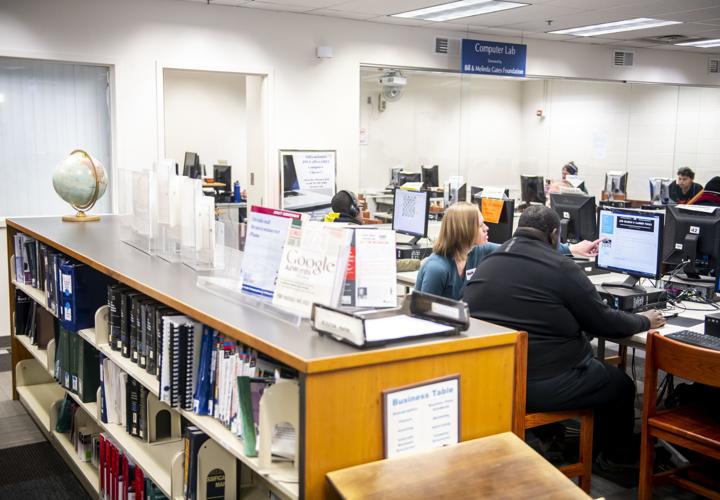Twenty years ago, Cathy de Rosa—the head of marketing for OCLC at the time—identified two significant core themes of perception around library services: the library as a trusted information resource but also the need for increased self-service (De Rosa et al., 2005, p. ix; Stephens, n.d.). These themes continue to be identified as key components for libraries to strive for as services necessary for citizens and their welfare are becoming increasingly digitized (Rebergen et al., 2025). Taxes, banking, healthcare, billing, pay, legal, and other services necessary for life are increasing their virtual presence, however this shift does not necessarily improve ease of access for all people (Moore, 2019; van Holstein et al., 2021).

Dohe (2019) expands on this idea of librarians as care workers through comparing the expectations of library service with Tronto’s ethics of care: responsibility, attentiveness, competence, and responsiveness (Tronto, 2012). Effective librarians reduce barriers to access, especially in the digital realm, by using these skills related to care. By employing “code switching” they can function as interpreters for patrons who feel stuck by technological barriers related to both physical access and disconnects in technical literacy (Dohe, 2019).
Combining digital care work with self-service tools enables patrons to fulfill their needs in conjunction with offering the most concern for their privacy. A survey conducted at Baltimore County Public Library revealed that 83.8% of patrons recognized the importance of privacy when utilizing library services, and 93.8% of surveyed patrons were satisfied with the level of privacy that the library enabled them through self-service options (Sigwald, 2016). Self-service tools such as automated computer labs, printers and copy machines, catalog terminals and self-checkouts, material reservation systems without full patron names, and after-hours access are just a few ways to encourage patron accessibility while preserving their privacy and autonomy.

Despite some library systems not having the capabilities to offer autonomy across all their services, this once again drives the point that compassionate library staff are essential to provide supportive spaces for their patrons (Kenney, 2014). Kaun and Forsman (2024) reflect on this balance of utilizing public tools with the assistance: “Librarians are caregivers not only because the library is a place for people to develop skills but also because care or caring in the service of someone else precisely involves emotions and uncertainty” (p. 3758).

References
Concepts in Millwork. (2024, December 10). Douglas County Library-Lone Tree [image]. https://conceptsinmillwork.com/our-project/douglas-county-library-lone-tree/
De Rosa, C., Cantrell, J., Cellentani, D., Hawk, J., Jenkins, L., & Wilson, A. (2005). Perceptions of libraries and information resources: A report to the OCLC membership. OCLC Online Computer Library Center. https://www.oclc.org/content/dam/oclc/reports/pdfs/Percept_all.pdf
Dohe, K. (2019, February 20). Care, code, and digital libraries: Embracing critical practice in digital library communities. In the Library with the Lead Pipe. https://www.inthelibrarywiththeleadpipe.org/2019/digital-libraries-critical-practice-in-communities/
fritsdejong. (2016, October 9). Tu Delft University [image]. Pixabay. https://pixabay.com/photos/tu-delft-university-library-1723434/
Kaun, A., & Forsman, M. (2024). Digital care work at public libraries: Making Digital First possible. New Media & Society, 26(7), 3751–3766. https://doi.org/10.1177/14614448221104234
Kenney, B. (2014, January 27). The user is (still) not broken. PublishersWeekly.com. https://www.publishersweekly.com/pw/by-topic/industry-news/libraries/article/60780-the-user-is-still-not-broken.html
Moore, S. (2019). Digital government, public participation and service transformation: the impact of virtual courts. Policy and Politics, 47(3), 495–509. https://doi.org/10.1332/030557319X15586039367509
Neshcheret, M. Y. (2022). Library user as self-librarian: Self-service in libraries. Bibliotekovedenie, 71(3), 265–275. https://doi.org/10.25281/0869-608X-2022-71-3-265-275
Rebergen, M., Swart J., & Broersma, M. (2025). Directing digital citizenship: How librarians mediate the Dutch digital welfare state. Social Inclusion, 13(0). https://doi.org/10.17645/si.9949
Rodgers, J. (2019, January 9). Colorado Springs library hires social worker to help homeless visitors [image]. Colorado Springs Gazette. https://gazette.com/2019/01/09/colorado-springs-library-hires-social-worker-to-help-homeless-visitors-ad5fd9aa-0eb6-11e9-a86f-cf86ae1fee66/
Sigwald, R. (2016). Self-service customer service models in libraries. Journal of Library Administration, 56(4), 453–478. https://doi.org/10.1080/01930826.2016.1157429
Stephens, M. (n.d.). “Historic” Hyperlinked Library Model (video with slides). https://sjsu-ischool.hosted.panopto.com/Panopto/Pages/Viewer.aspx?id=a0569381-4d66-4e0a-a7fa-aab3010a8f3e
Tronto, J. (2012). Partiality based on relational responsibilities: Another approach to global ethics. Ethics and Social Welfare 6(3), 303-316. https://doi.org/10.1080/17496535.2012.704058
van Holstein, E., Wiesel, I., Bigby, C., & Gleeson, B. (2021). People with intellectual disability and the digitization of services. Geoforum, 119, 133–142. https://doi.org/10.1016/j.geoforum.2020.12.022
Wing, K. (2019). Use of self-service holds in Maine public libraries. Public Library Quarterly (New York, N.Y.), 38(1), 85–102. https://doi.org/10.1080/01616846.2018.1548895

Hi Katelyn,
I enjoyed your analysis of the intersection of digital service, care work, and self-service tools. The cliche of teaching a man to fish, instead of fishing for him, comes to mind. Of course, the hungry man should learn to fish, but at what cost? There is the time, effort, and other miscellaneous resources that it takes to successfully teach someone to the point that they can operate independently. It’s a lot of work, but always worth the investment. Computer and tech skills have been an obvious and foreboding challenge for our society, and the digital divide that is now separating the tech literate from the tech illiterate in letting more and more people fall through the cracks. I confess, even though I am in grad school in a tech field, I will always have more to learn, and would benefit from librarian assistance for civil services.
Independence and self-sufficiency should be a goal that MLIS professionals strive for our patrons. Not only should we provide them with tools for self-sufficiency, but we should also seek to enable our patrons to be as self-sufficient as possible. By not investing in tools like self-service checkouts, you leave patrons no choice but to rely on or externalize the autonomy to the librarian or staff member. In my work as a paraprofessional for over 10 years, being a provider of choice and enabling my clients was the pinnacle of care. My job was not to do everything for them, but to work with them towards independence and autonomy, always. That’s the kind of service I want to bring into librarianship.
Thanks for your comment @gardenlib! I think an aspect that’s vital to recognize in patron services is that not everyone is on the same playing field. Experience and exposure, disabilities, age, and financial constraints are all factors that can sometimes severely restrict the capacity for someone to “learn to fish” so to speak. Often we hold ideas that don’t match with everyone’s reality. For example, a few years back I helped a patron who was roughly 18 years old to send his first email on a computer—his family never had one and it wasn’t part of his high school curriculum. He was very slow to use the computer but over time he became relatively self-sufficient in typical computer use with experience and compassionate assistance.
“Being a provider of choice and enabling my clients was the pinnacle of care.”
I love this statement and agree wholeheartedly. The library is a building of tools with many ways to accomplish the same thing. Helping others achieve autonomy by providing options and a guiding hand is definitely a peak experience for a library professional.
**”Often we hold ideas that don’t match with everyone’s reality.”**
Absolutely, I agree, and wonderful example. The challenge then lies in meeting the needs of the majority with impact, while making sure we are supporting minority needs with a safety net of sorts. A principle I stand by is being a provider of choice. We cannot predict, nor shouldn’t assume preferences, and leaving space for and intentionally giving people their own sense of autonomy to choose can be a way to meet the needs of many. While there is no perfect solution, diversifying potential options for patrons is ideal for diverse needs for diverse people.